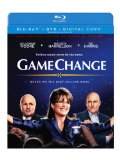| Reviews & Columns |
|
Reviews DVD TV on DVD Blu-ray 4K UHD International DVDs In Theaters Reviews by Studio Video Games Features Collector Series DVDs Easter Egg Database Interviews DVD Talk Radio Feature Articles Columns Anime Talk DVD Savant Horror DVDs The M.O.D. Squad Art House HD Talk Silent DVD
|
DVD Talk Forum |
|
|
| Resources |
|
DVD Price Search Customer Service #'s RCE Info Links |
|
Columns
|
|
|
Game Change
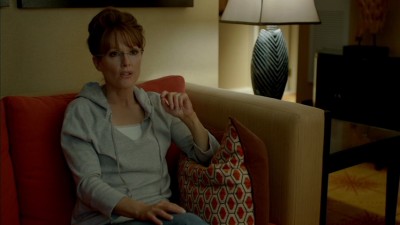
Please Note: The images used here are from the included DVD edition, not the Blu-ray version.
If, at the time of late 2008's contentious presidential election and brutal economic meltdown, you'd told me that current events would, come 2012 and via HBO, give rise to a scenario in which L.A. Confidential/Wonder Boys director Curtis Hanson would prove himself an inferior filmmaker to Austin Powers/Meet the Parents director Jay Roach, I would have scoffed. But I would've been wrong: Too Big to Fail, Hanson's made-for-HBO movie about Wall Street and the financial crisis, was rather poor, a disappointment coming from a filmmaker who'd built up some real credibility, while Roach's experience in comedy seems to have given him some apt preparation for Game Change, his own more recent HBO film based on the bestseller by Mark Halperin and John Heilemann, which investigates in detail both campaigns of the 2008 presidential election . It definitely helps that Roach and screenwriter Danny Strong (Recount) have extracted the one-third or so of Halperin's and Heilemann's tome that's concerned with the McCain/Palin campaign and focused exclusively on it, giving themselves a central figure -- Tea Party queen, right-wing cover girl, TV talking head, and "author" Sarah Palin -- that, with her starting out in over her head and cluelessly sinking ever deeper, along with her hapless delusions of being intelligent and qualified, combines the comedic-goldmine elements of hapless Meet the Parents's Greg Focker with those of the undeservingly cocky Austin Powers. Any good, honest comedian, regardless of their own political convictions, will tell you that Palin temporarily saved their lives as the vocabulary-challenged specter of our prior president mercifully faded away, and Game Change is, of course, primarily a comedy, capitalizing on the rich material with which the ambitious Palin, always reliably un-self-conscious about her own astounding ignorance to the point of almost being charming, happily provided. As comedies go, however, Game Change gradually reveals itself to be an unexpectedly dark and substantive one; if its execution doesn't nearly rival Sidney Lumet's classic, its surprise payload of sheer, smartly observant cynicism can be compared to that of Network.
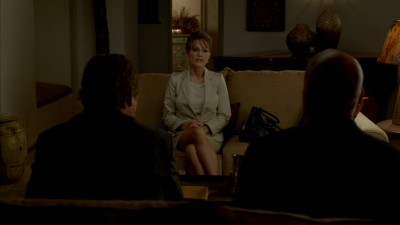
The now-legendarily excellent, diversely talented Julianne Moore is the actress who landed the irresistible opportunity to fill Palin's shoes, and she does a remarkable job, though the film skimps on rounding out any of its characters by really showing us where they came from, how they came to hold their political ideas, or what first brought them into the political sphere, so Moore is not called upon to do much more than an uncanny impression of Palin's body language and the boy-howdy accent that McCain's advisors rightly assumed would appeal, in its appearance of ordinariness, to a big slice of the American electorate too resentful -- and too low-paid and poorly-educated to focus their resentment toward the (conservative) policies responsible for low pay and poor education -- to care that Palin, however "likable," was also demonstrably dumb from the moment she opened her mouth on national television. Still, Game Change is much more than an SNL parody (great as Tina Fey was) of Palin's equally cringe- and laughter-inducing performances: As the film shows through its other principal characters -- the reluctantly recruited political advisor Steve Schdmidt (Woody Harrelson, who has by now well acquitted himself as an actor capable of an intensity that long ago made us forget Woody Boyd, and continues to do so here) and Palin's increasingly frustrated and disliked keeper/helper/flashcard-holder, Nicolle Wallace (Sarah Paulson, whose excellent character work as Wallace equals her contributions to The Notorious Bettie Page and Martha Marcy May Marlene) -- the folly of her nomination was not Palin's mistake so much as it was the McCain campaign's, which was unbelievably reckless in its haste to vie with Barack Obama's celebrity appeal and, in the film's telling, realized their error only when it was too late to take a wiser course, transforming a tough campaign into one that, with the added burden of Palin, became an interminable living hell for them all to live through, with a practically-guaranteed failure to come that they could only try to hide from McCain for as long as possible. Any sympathy Game Change has for Palin (and it's not entirely devoid of it) comes from the cruel national exposure, which she genuinely did not expect, of her own utter lack of qualification, to which she was subjected by the McCain campaign's failure to properly vet her. The way Halperin, Heilemann, and Strong tell it, the McCain higher-ups gave far too much credence to Palin's inarguable potential to be a celebrity, entirely ignoring the part of the Obama vetting/nomination process that took into account both personality and intellect; the consequent dramatic fireworks that arise from Schmidt's and Wallace's increasing consternation with the irksome Palin, and the escalating tension between the shamed and pouting VP candidate and the externally patient, inwardly forehead-smacking staffers, are what makes the film not just funny, but actually dramatically potent and kinetic.
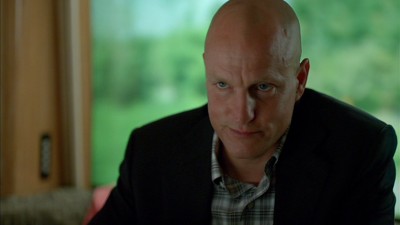
Roach, Strong, and the cast create a comedy of errors that plays out in a suitably restrained, straightforward way, incorporating enough but not too much actual news footage, with some scintillating scenes (the ones between Harrelson and Moore in the final third of the film are especially strong) thanks to the powder keg comprised of Palin's obstinacy and the well-meaning, fruitless attempts of McCain's campaign to make her intellectually presentable, which finally explodes and burns McCain's chances down with it. While, despite the evidently astute eye for composition and color of cinematographer Jim Denault (Boys Don't Cry, Maria Full of Grace), Game Change is never aesthetically inventive or exhilarating, Moore's and Harrelson's performances, along with Roach's good feel for Strong's arc of failure in the political arena -- and that failure's midstream, ship-jumping transformation by Palin into a launching pad for her more lucrative (if ignoble and disposable) reality-TV career -- makes the film more or less worthy of the usually reliable HBO seal of quality, placing much of it in the upper echelons of the long-disdained made-for-TV film. (Ed Harris, for his rather small part, is decent as John McCain, but in the context of the film, his presence feels awkward, unnecessary; the drama really comes from Palin's increasingly devious bone-picking with senior staffers, not any conflict between her and the kindly/fatherly/resigned McCain; Game Change would have been that much better if it could've found a way to eliminate McCain altogether.) It is bogged down in the first half-hour or so by exposition that makes it clear the producers were hoping to attract viewers who knew literally nothing about the 2008 election or the McCain campaign (another liability is the standard-issue, overemphatic score by Theodore Shapiro), but it doesn't take things too long to get into a groove that, in terms of quality, puts the film frequently on a par with politically-minded efforts like The West Wing or Oliver Stone's W.
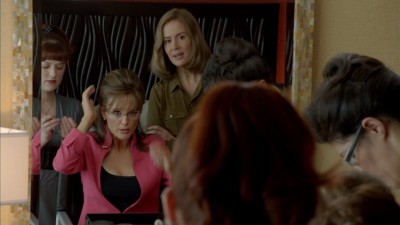
I'll be the first to admit my left-wing bias, and proudly, too (while insisting that it's always anyone's claim of no bias that should be the most immediate cause for suspicion), but I will make the case to any more rightward-inclined reader that, had Roach and Strong instead decided to make a comedy about President Obama's constant selling out of any actual progressive principles in his pointless, fruitless attempts (as obvious and clueless in its way as Palin's cheerful stupidity) to be "bipartisan" and liked (or even respected) by a political opposition that will despise him no matter what (if only he had, in reality, even a small shred of the "socialism" he's inexplicably been accused of, but no), I'd consider that only slightly less worthy of mockery and laughter than Palin's scarily self-confident thickness. Most importantly, the only reason that I would've recommended such a reverse-mirror-image project would have been for the same reason I'm recommending Game Change: Its choice of subject may be partisan, but its incisive and astute glimpse into the way any contemporary, national-level U.S. political campaign is run, what motivates its decisions, and what political operatives actually think of the American electorate (and how right they probably are about our need to be spoon-fed, coddled, and condescended to, slack-jawed and credulous in front of our TVs as we are) will strike a chord with disillusioned viewers from across the political spectrum. We can all have a good laugh at this or that political figure's personality quirks, be they a degree of ignorance you couldn't plausibly make up or an alarming spinelessness verging on hypocrisy. But Game Change's real point, subtly but quite clearly made, is that it's the emphasis on personality in our politics that leads to such ludicrousness and ineffectuality. In a televised-nonstop, image-obsessed, virtually substance-free political/entertainment-hybrid world -- the void in which all political "discussion" and decision-making seems doomed to play out forever -- we can laugh all we want at such things, but we can't deny that the ultimate responsibility for Game Change's depressing scenario lies with an audience-electorate whose preferences and behaviors would convince any sentient observer that we want our politics to be a laughable popularity contest among celebs, and we can't escape the conclusion that the joke is ultimately on us.
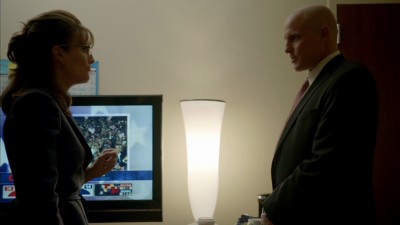
THE BLU-RAY DISC:
The transfer (AVC/MPEG4, 1080p) preserves Game Change's original widescreen broadcast aspect ratio of 1.78:1. There doesn't appear to have been a single deterioration in picture quality in the transfer from the film's original high-def digital-video sources to digital home media: All the colors are vivid, the various lighting textures well-differentiated, skin tones look natural, and all dark/black portions of the image are rock-solid.
Sound:The DTS-HD Master Audio soundtrack is excellent, with all dialogue crystal-clear, rich, and immediate, and all music and other sounds layered in nicely and expanding out smoothly and thoroughly to surround you with the film's sound. No distortions or imbalances at any point mar the impressive audio here.
Extras:Surprisingly, not too much (beyond the inclusion of both DVD and digital versions of the film in addition to the Blu-ray), and nothing with the cast; just two five-minute featurettes that are less behind-the-scenes than context. "Creating a Candidate" has political experts discussing the depressing state of the TV-driven, celebritized, popularity-contest politics that have increasingly infested and narrowed the American political spectrum since Kennedy, while "Game Change: The Phenomenon" brings in authors Mark Halperin and John Heilemann, along with scriptor Danny Strong and director Jay Roach, to discuss their choice to extract the Palin VP pick storyline from a book that covered the entire campaign.

The lure of sensationalist political-personality scandal in Game Change -- the guilt-ridden schadenfreude that are the primary responses many viewers will experience upon witnessing Julianne Moore's spot-on, unexaggerated (there's no need) Palin simulation and the recounting of the former Alaska governor's abysmal effects on the McCain presidential campaign -- proves that HBO, screenwriter Danny Strong, and director Jay Roach made the sage choice when they decided to extract the McCain/Palin-devoted third of Mark Halperin's and John Heilemann's nonfiction bestseller on the '08 presidential race, then ladled that embarrassing story generously into the deliciously empty-calorie TV-movie format. That's not to say that there's not plenty of visual skill and competence to be found in Game Change, just that its creators and performers know full well what they're doing, and their conviction that the '08 presidential race is perfectly suited to TV-movie trashiness is contagious. No cinematic loftiness of vision is allowed to cloud the film's replaying of the rancor within the McCain campaign that begins building the second Palin is tapped, which all comes through loud and clear in the vicious behind-the-scenes standoffs between Moore's ambitious, hardworking, undeniably charismatic (then recalcitrantly and irreparably ignorant, dense, and childish) Palin; the reluctant McCain campaign advisor (Woody Harrelson) who pushed for the appealingly sassy lady and lived to curse her for her deceitful idiocy and himself for his hastiness; and the beleaguered, true-believing VP-coach/consultant played by Sarah Paulson (as depicted here, one wonders more than once why this character couldn't have been the Republican VP candidate) who, having been assigned the futile task of making Palin appear as if she knows anything about anything, grows to hate Palin and the cynicism she signifies more than anyone, to the point that she doesn't even cast her vote in the election. Game Change's most important point comes across all the better through the film's well-played TV trashiness: If the degree of vapidity Palin was allowed to bring onto the national stage and shame McCain with is jaw-dropping, the loud surge of proud, self-righteous know-nothingness she appealed to on the Tea Party-right dismaying, it's the insulting, cynical across-the-board equating of celeb appeal with political worthiness in all two-party American politics that lies at the root of the problem. Game Change becomes something like an actually subversive wake-up call once you realize that its true joke is on all of us; that its subject is Sarah Palin merely because she's the most salient, hysterically depressing '08 illustration of the simpleminded TV addiction that afflicts far too many voters Republican, Democrat, or other; and that the deeper point of its cautionary fable is that when an entertainment-addled electorate actively refuses to think critically and demonstrates its complacency in no uncertain terms to its politicians, it gets the candidates it deserves. Recommended.
|
| Popular Reviews |
| Sponsored Links |
|
|
| Sponsored Links |
|
|
| Release List | Reviews | Shop | Newsletter | Forum | DVD Giveaways | Blu-Ray | Advertise |
|
Copyright 2024 DVDTalk.com All Rights Reserved. Legal Info, Privacy Policy, Terms of Use,
Manage Preferences,
Your Privacy Choices | |||||||









